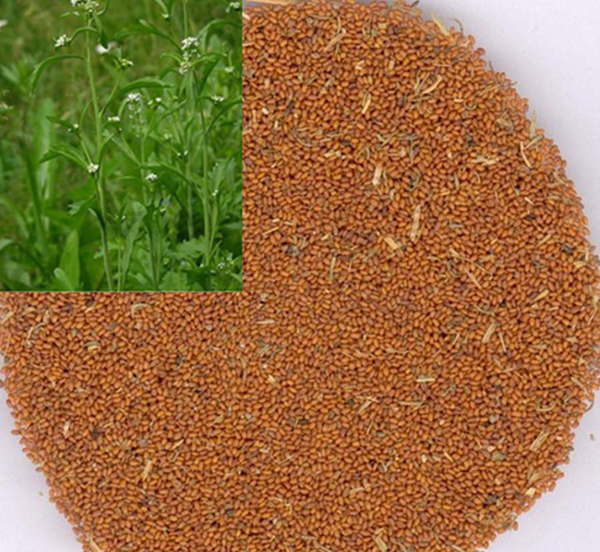Peppergrass seeds, also known as pepperwort or peppercress seed and Ting Li Zi in mandarin, are one of essential Chinese herbs that can remove heat from lung to relieve asthma. In the words of modern medicine, it is a leading drug for upper respiratory infection, bronchitis, Emphysema, precordial pain, and other diseases that are characterized by coughing, phlegm, asthma, or accompanied with edema. In addition, many ancient physicians have found creative applications about this herb, which clinically can yield extraordinary results in the treatment of scrofula, gastritis, amenorrhea, and more. Now pharmacological studies confirm that it has significant antitussive, antiasthmatic, cardiotonic, diuretic, and anti-inflammatory effects.
Medicinally it mainly refers to the mature seeds of Lepidium apetalum Willd. (Du Xing Cai) or Lepidium virginicum L. (Virginian peppercress), which are members in the mustard family, Brassicaceae. Besides, the seed of Descurainia sophia (L.) Webb ex Prantl (Sisymbrium sophia) is believed with the same medicinal uses. For that reason, Descurainia sophia seed is also named "Nan Ting Li Zi". Other common names of it include Semen Lepidii, Tingli Seed, Lepidium Seed, Pepperweed seed, Tansymustard Seed, and more. In China lepidium apetalum is mainly produced in the provinces of Hebei, Liaoning, Inner Mongolia, and Jilin. Its whole plants are usually collected in summer when the fruits are ripe. After that, dry them in the sun, remove the coating from the seed by rubbing it, and get rid of the impurities. Medicinally it is used raw or fried.

Peppergrass Seeds
PEPPERGRASS BENEFITS
From the perspective of traditional Chinese medicine, peppergrass seeds' main health benefits are to descend Qi and promote water metabolism. Thus, it treats dyspnea due to phlegm obstructing the lung, cough caused by phlegm and fluid retention, edema, etc. Today lung abscess has been very rare in the city and clinically antibiotics are the regular remedy for yellow sputum in pulmonary bronchitis caused by bacterial infection. It seems that it is useless these days. On the contrary, it plays a more important role now in those antibiotic-resistant patients who suffer from chronic infections with yellow sputum white sputum, such as chronic nonspecific interstitial pneumonia, chronic bronchitis, chronic bronchiectasis, and the like. After all, clinically peppergrass seed and Sang Bai Pi (mulberry bark) are the most frequently used two that clear lung and eliminate phlegm.
As a matter of fact, these two herbs often occur in pair. The reason for the combination is twofold: both of them can purge the lung to calm panting and induce diuresis to alleviate edema, plus they supplement each other since they have their own respective advantages. Specifically, mulberry bark is of sweet cold nature and with moderate healing properties. It is good at clearing lung heat and descending lung fire. So, it is more fore lung-heat induced cough, asthma, yellow sputum, and skin edema; peppergrass seed has more powerful healing properties, focusing on purging pathogenic water and phlegm in lung. This makes it a particularly appropriate medication for sleeplessness and dyspnea due to prosperous pathogen. What's more, it is with much stronger ability of alleviating water retention so that it is also used for the treatment of distention, Pleural Effusion, and Ascites.

![Diseases, Symptoms, tcm, [tcmwindow.com]](/uploadFile/adImg/2015/11/11/f5cbfcc0-4df5-4646-9b9a-f316651a0199.jpg)





